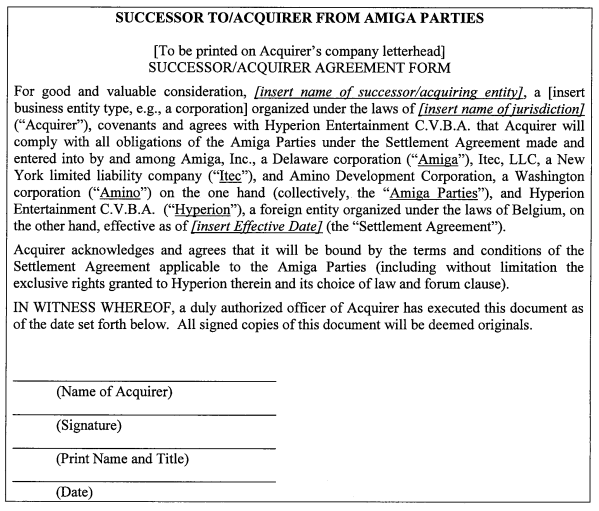Apparently someone is still interested in the Amiga operating system.
In 2009, non-party Amiga, Inc. and defendant Hyperion Entertainment C.V.B.A. entered into a settlement agreement that resolved a number of lawsuits between them. The plaintiff, Cloanto Corp., was a licensee of Amiga at the time of the settlement agreement and mentioned in the agreement but not a party.
Plaintiff Cloanto now claims to be a successor to Amiga. Cloanto alleges that Hyperion is in breach of the Amiga-Hyperion agreement and sued Hyperion for a variety of wrongs, as described by the court: “Suffice it to say that this case deals with copyrights, trademarks, and the right to sell software related to the Amiga operating system.” Hyperion retorted that Cloanto did not have standing.
The agreement said that it was not assignable. However, Cloanto claimed that it was an “Acquirer,” a term used in the agreement. The agreement included an Exhibit to be signed by a “successor/acquiring entity.”
Cloanto signed it and gave it to Hyperion. The form said that the Acquirer “covenants and agrees with Hyperion Entertainment C.V.B.A. that Acquirer will comply with all obligations of the Amiga Parties under the Settlement Agreement …” and that Acquirer “acknowledges and agrees that it will be bound by the terms and conditions of the Settlement Agreement applicable to the Amiga Parties …” The form only needed one signature, of the Acquirer.
The question before the Court is whether Cloanto has standing to sue in the shoes of Amiga after signing this Successor/Acquirer Agreement Form. This question turns on the difference between a “Successor/Acquirer” and an “assignee.” The Court notes that “[l]awsuits by assignees of contract rights satisfy Article III standing requirements.”
The form at Exhibit 3 is not itself a valid contract between Cloanto and Hyperion. At best, the fill-in-the-blank Exhibit 3 indicates that the Amiga Parties and Hyperion contracted to allow the Amiga Parties to transfer “all obligations of the Amiga Parties” and “the terms and conditions of the Settlement Agreement applicable to the Amiga Parties” to a successor entity. This language appears carefully worded to avoid transferring the Amiga Parties’ rights under the Settlement Agreement. Coupled with a plain language reading of the clause prohibiting assignment of the Agreement to a third party without Hyperion’s consent, which has not been given, the Court agrees with Hyperion that Cloanto has not acquired standing to sue for breach of contract.
Cloanto Corp. v. Hyperion Enter. CVBA, No. C18-381 RSM (W.D. Wash. May 16, 2019).

This work is licensed under a Creative Commons Attribution-NoDerivatives 4.0 International License.


Leave a Reply